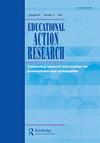Enhancing student engagement in large ESL classes at a Pakistani university
IF 1.2
Q3 EDUCATION & EDUCATIONAL RESEARCH
引用次数: 1
Abstract
ABSTRACT This study addresses lack of student engagement in large English as a second language (ESL) classes at a Pakistani university, using cooperative learning within the framework of participatory action research. A reconnaissance of the literature and thorough situation analysis led to an initial plan based on two cooperative learning strategies: Student-Teams-Achievement-Divisions and Think-Pair-Share. Over a semester, a second-year undergraduate compulsory ESL class was delivered as a series of mini action-research cycles refining this plan. The intervention was evaluated using classroom observation, student questionnaires and semi-structured group interviews. The results indicate that cooperative learning enhanced students’ behavioural, cognitive, and emotional engagement relative to their previous experience of learning in lecture-style classes. In addition, the study demonstrates that action research can be used by individual practitioners in even highly problematic teaching environments as a way of emancipating themselves and their students from the helplessness associated with institutional and cultural constraints.提高学生在巴基斯坦一所大学的大型ESL课程中的参与度
本文章由计算机程序翻译,如有差异,请以英文原文为准。
求助全文
约1分钟内获得全文
求助全文
来源期刊

Educational Action Research
EDUCATION & EDUCATIONAL RESEARCH-
CiteScore
3.10
自引率
8.30%
发文量
48
期刊介绍:
Educational Action Research is concerned with exploring the dialogue between research and practice in educational settings. The considerable increase in interest in action research in recent years has been accompanied by the development of a number of different approaches: for example, to promote reflective practice; professional development; empowerment; understanding of tacit professional knowledge; curriculum development; individual, institutional and community change; and development of democratic management and administration. Proponents of all these share the common aim of ending the dislocation of research from practice, an aim which links them with those involved in participatory research and action inquiry. This journal publishes accounts of a range of action research and related studies, in education and across the professions, with the aim of making their outcomes widely available and exemplifying the variety of possible styles of reporting. It aims to establish and maintain a review of the literature of action research. It also provides a forum for dialogue on the methodological and epistemological issues, enabling different approaches to be subjected to critical reflection and analysis. The impetus for Educational Action Research came from CARN, the Collaborative Action Research Network, and since its foundation in 1992, EAR has been important in extending and strengthening this international network.
 求助内容:
求助内容: 应助结果提醒方式:
应助结果提醒方式:


